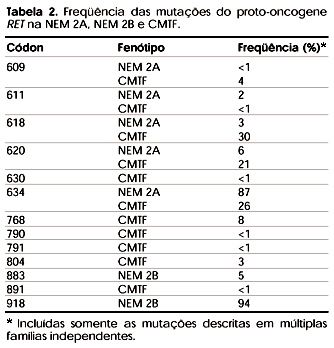Medullary thyroid carcinoma (MTC) is a rare malignant tumor arising from thyroid C cells. It represents 3-10% of all thyroid tumors and is responsible for a great number of deaths in patients with thyroid carcinoma. In 75-90% of patients, MTC is sporadic; in the remaining cases, it is an autosomal dominant disease with a high degree of penetrance and variability of expression which may be part of 3 distinct syndromes: multiple endocrine neoplasia (MEN) type 2A, MEN 2B, and familial MTC. Different clinical forms of MTC, mainly those hereditary forms, are related to mutations in the RET proto-oncogene, which result in a constitutive activation of the transmembrane tyrosine kinase receptor. The distinction between sporadic and familial forms is of extreme clinical relevance because of differences in prognosis and the need for family screening, genetic counseling and close clinical follow up in the inherited forms. Genetic study of the proto-oncogene RET allows the identification of asymptomatic carriers of RET mutations, leading to an early and effective surgical management reducing the morbidity and mortality associated with this disease.
Medullary thyroid carcinoma; Calcitonin; RET proto-oncogene; Genetic screening


